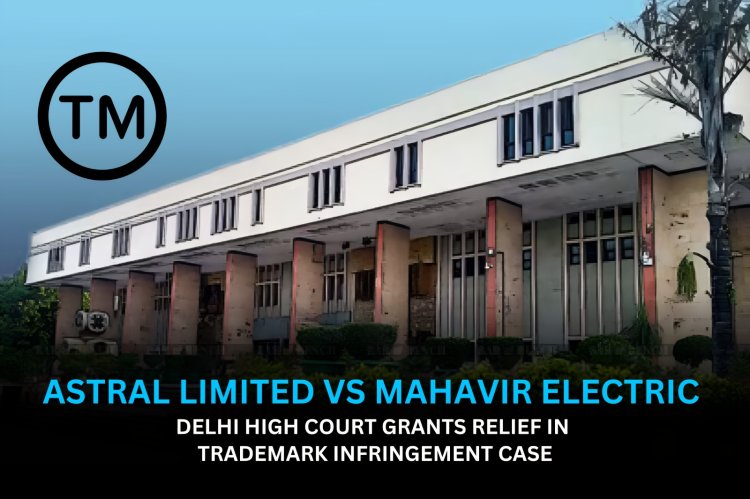Astral Limited vs Mahavir Electric – Delhi High Court Grants Relief in Trademark Infringement Case
In a landmark judgment, the Delhi High Court granted a permanent injunction and damages to Astral Limited against Mahavir Electric and Hardware Stores for trademark infringement and passing off. The case emphasizes territorial jurisdiction in online IP violations and reinforces protection for well-known brands under the Trade Marks Act, 1999.

1. Background of the Case
The plaintiff, a public limited company engaged in the business of manufacturing and selling high-quality pipes, fittings, adhesives, and related products, operates under the well-known brand name ASTRAL. The mark "ASTRAL" has been in commercial use since 1996 and is duly registered across multiple classes under the Trade Marks Act, 1999.
Over the years, the plaintiff has extensively promoted its brand through various channels, including television, social media, e-commerce platforms, and high-profile sponsorships such as those for IPL teams. It also owns domain names like www.astralpipes.com and www.astralpipes.in.
In March 2023, the plaintiff discovered that the defendants — operating under the names Mahavir Electric and Hardware Stores and Vikram Traders — were engaged in the unauthorized manufacturing, selling, and marketing of counterfeit goods bearing the ASTRAL trademark, both offline and through online platforms like IndiaMART and JustDial. Following this discovery, the plaintiff initiated a trademark infringement and passing-off suit under Sections 134 and 135 of the Trade Marks Act, 1999.
2. Issues Before the Court
- Whether the defendants infringed the plaintiff’s registered trademark "ASTRAL" by using an identical or deceptively similar mark?
- Whether the defendants’ actions amounted to passing off under common law?
- Whether the plaintiff is entitled to permanent injunction, damages, and litigation costs?
- Whether the Court at South Delhi had the territorial jurisdiction to entertain the suit?
3. Plaintiff's Arguments
- The plaintiff contended that it is the rightful proprietor of the mark "ASTRAL" and has made significant investment in building the brand's reputation and consumer recognition.
- The defendants deliberately adopted an identical trademark to mislead consumers and benefit from the plaintiff’s goodwill.
- The products sold by the defendants were counterfeit and falsely carried the registered trademark symbol ® to deceive the public.
- The unauthorized use of the trademark diluted the brand's image and caused commercial losses.
- The plaintiff argued that since the defendants were operating through interactive e-commerce websites accessible in South Delhi, the Court had valid territorial jurisdiction.
- It sought a permanent injunction, destruction of infringing stock, damages of ₹3,10,000, and litigation costs.
4. Defendant’s (Respondents') Arguments
- The defendants failed to file a written statement despite appearing once after service.
- No formal defense or counterclaim was submitted.
- Due to non-appearance in subsequent proceedings, the matter proceeded ex parte.
- Therefore, no rebuttal or justification for the use of the ASTRAL mark was presented by the defendants.
To know more about this you can follow the link below:
5. Legal Analysis
Under the Trade Marks Act, 1999:
- Section 29 provides that a registered trademark is infringed when another party uses an identical or deceptively similar mark in the course of trade.
- Section 134 permits the proprietor to institute proceedings in the jurisdiction where they carry on business, even if the infringement occurred elsewhere.
- Section 135 empowers the court to grant relief by way of injunctions, damages, and account of profits.
- Passing off, as a common law remedy, protects unregistered marks by preventing misrepresentation that harms the reputation and business of the original brand owner.
In this case, the plaintiff was able to demonstrate both statutory infringement and common law passing off through unrebutted evidence and documents.
6. Precedent Analysis
The Court relied heavily on two leading judgments to affirm its territorial jurisdiction:
- Tata Sons Pvt. Ltd. v. Hakunamatata Tata Founders & Ors.
The Delhi High Court reiterated that even if a website isn’t directly targeting a particular location, its accessibility and interactivity in that region is sufficient to claim jurisdiction. - Banyan Tree Holding (P) Ltd. v. A. Murali Krishna Reddy
This case established that online presence and "purposeful availment" through virtual platforms may vest jurisdiction in a location where the website is accessed and the business is conducted.
These cases supported the plaintiff's claim that the South Delhi court was the appropriate forum, given the online and offline sales activities of the defendant in the region.
7. Court's Reasoning
- The Court held that the plaintiff had proven its rights in the "ASTRAL" trademark through documentary evidence and oral testimony of its authorized representative (PW-1).
- The visual and phonetic similarity between the plaintiff’s and defendant’s marks, supported by lab reports, Local Commissioner’s inspection, and product comparisons, established deliberate infringement.
- Given the lack of rebuttal or written statement from the defendants, the Court drew adverse inferences and proceeded to grant relief based on the uncontested version of the plaintiff.
- It held that the plaintiff was entitled to relief under the Trade Marks Act, and the suit was filed within limitation.
8. Conclusion
The Court ruled in favor of the plaintiff and passed the following directions:
- A permanent injunction restraining the defendants from using the mark "ASTRAL" or any deceptively similar variant, in any form — physical or digital.
- An order directing the immediate destruction of all infringing products seized from the defendant’s premises.
- The defendants were ordered to pay ₹3,10,000 as damages and ₹3,50,000 towards litigation costs, totaling ₹6,60,000, payable within three months from the date of decree.
The judgment reinforces that unauthorized use of a well-known trademark, even via digital platforms, constitutes infringement and passing off, and courts will grant robust remedies to protect the intellectual property of genuine rights holders.












